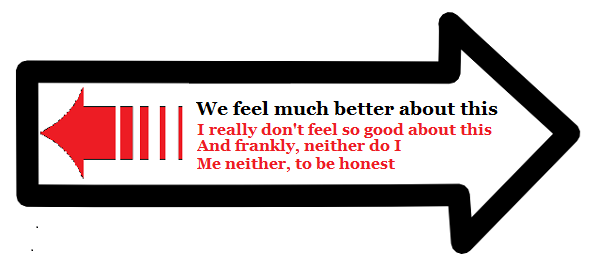[ by Charles Cameron — paradox: individual health goes down while societal health improves ]
.

I knew this “reverse arrows” graphic would find a multitude of uses.
**
Here’s the news report:
Post-conflict reconciliation led to societal healing, but worsened psychological health.
Key paras:
Civil wars divide nations along social, economic, and political lines, often pitting neighbors against each other. In the aftermath of civil wars, many countries undertake truth and reconciliation efforts to restore social cohesion, but little has been known about whether these programs reach their intended goals.
A new study published in Science suggests reconciliation programs promote societal healing, but that these gains come at the cost of reduced psychological health, worsening depression, anxiety, and trauma.
“Our research suggests that talking about war atrocities can prove psychologically traumatic for people affected by war. Invoking war memories appears to re-open old war wounds,” said Oeindrila Dube, assistant professor of politics and economics at New York University and one of the authors of the study. “At the same time, the reconciliation program we examined was also shown to improve social relations in communities divided by the war.”
¶ ¶ ¶
The study took place across 200 villages, 100 of which were randomly chosen to be offered the reconciliation program. The research team tracked 2,383 people in both sets of villages, recording their attitudes towards former combatants, their mental health, and the strength of their social ties nine and 31 months after the program.
The study was made in Sierra Leone a decade after the civil war ended. Assuming the methodology is good and the results are as described, there’s a very interesting paradox here. And hey, a decent paradox really gets my mental feet a-tapping. It will be instructive to see whether similar results are found elsewhere.
**
The study is J. Cilliers, O. Dube, B. Siddiqi. Reconciling after civil conflict increases social capital but decreases individual well-being. Science, 2016; 352 (6287): 787 DOI: 10.1126/science.aad9682 — to which I have no access, and which would very likely prove beyond my comprehension in any case.



